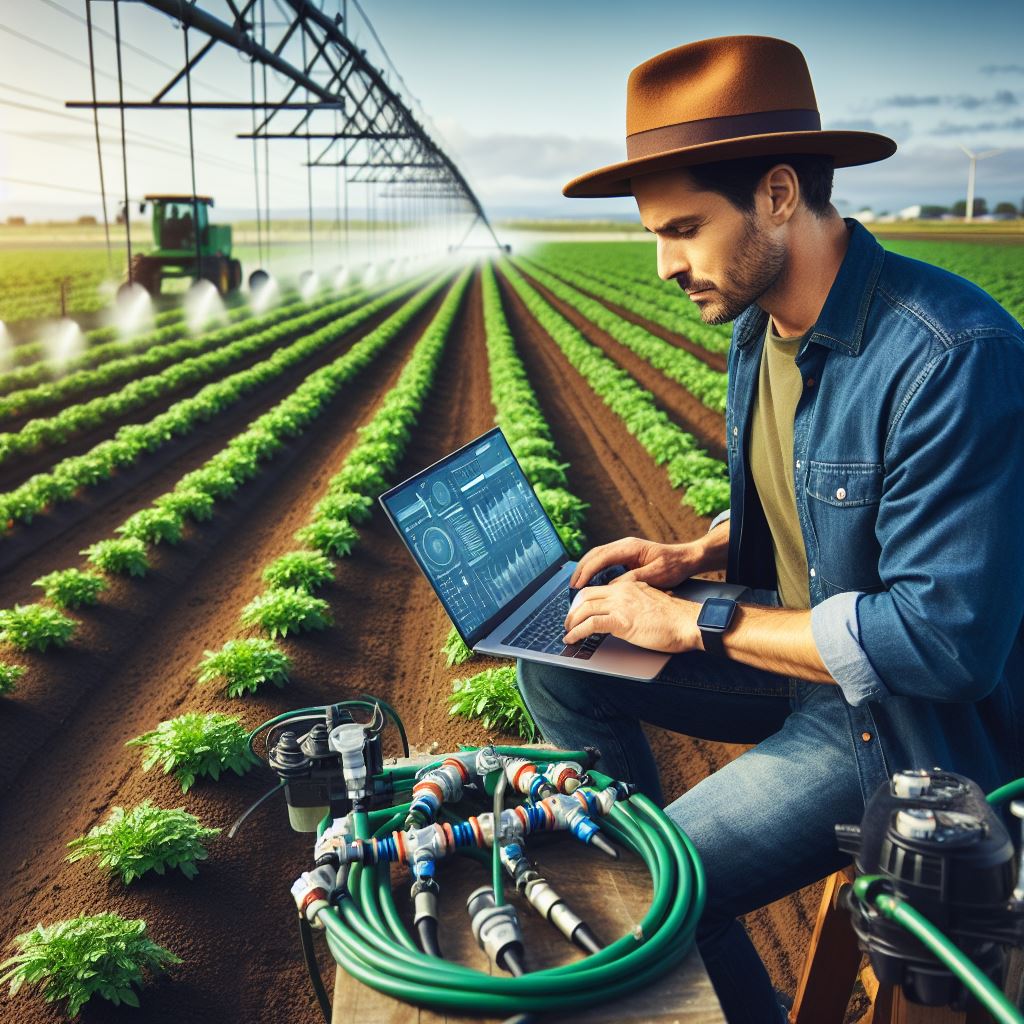Introduction
Maximize Yields Minimize Water in Urban Farms not only ensures a sustainable approach but also contributes to providing fresh produce and greenspace in cities through urban farming.
Community and rooftop gardens bring food security and environmental benefits.
But urban farms face unique challenges.
Limited space requires maximizing crop yields.
Water restrictions necessitate careful conservation.
Balancing these factors takes innovative solutions.
Urban farms often lack sprawling irrigation systems.
Careful hand-watering is required. Drip irrigation delivers water directly to plant roots.
Smart controllers adjust for weather and soil moisture.
But water runoff from compacted urban soils remains a concern.
Drought-tolerant plant varieties reduce water needs.
Crops like tomatoes, peppers and leafy greens thrive in containers. Still, yields can suffer under water stress.
Specialized growing mediums hold moisture while allowing drainage.
Hydrogels and water retention crystals mixed into soil maximize available water.
Self-watering containers maintain optimal moisture levels.
Transform Your Agribusiness
Unlock your farm's potential with expert advice tailored to your needs. Get actionable steps that drive real results.
Get StartedAutomated sensors assist irrigation decisions.
Rainwater catchment reduces municipal water use.
Together, these strategies allow bountiful harvests with minimal water in urban settings.
Basically, urban farming requires creative thinking to produce abundant and sustainable yields.
Growers must leverage smart irrigation methods, plant selection, and moisture-retaining soils.
With informed techniques, urban farms can flourish while conserving water.
Understanding water usage in urban farms
Water requirements of different crops
- Tomatoes require approximately 3.5 gallons of water per week to support healthy growth.
- Leafy greens, such as lettuce and spinach, need roughly 1 to 1.5 inches of water per week.
- Root crops, like carrots and radishes, have lower water demands, needing around 1 inch per week.
- Herbs, such as basil and mint, typically need about 1 inch of water every week.
Factors influencing water usage in urban farming
- Climate: Areas with hotter and drier climates may require more water for crop irrigation.
- Soil type and quality: Sandy soils tend to drain faster, requiring more frequent watering.
- Plant age: Younger plants generally need more water than mature ones.
- Seasonal variations: Water requirements change depending on the crop’s growth stage and weather conditions.
- Mulching: Applying organic mulch around plants helps retain moisture in the soil, reducing water needs.
- Plant density: Dense planting can create shade, reducing evaporation and water loss.
- Irrigation methods: Using drip irrigation or soaker hoses directly to the plants’ roots minimizes wastage.
- Rainwater harvesting: Collecting rainwater can supplement irrigation needs, reducing reliance on freshwater sources.
- Crop selection: Choosing drought-tolerant varieties or native plants that require less water can help save resources.
- Crop rotation and companion planting: Alternating crops and planting compatible species can optimize water usage.
Water requirements of different crops
Water conservation practices in urban farming are crucial for sustainable and efficient food production.
Urban farms face unique challenges due to limited space and resources; thus, understanding water usage is essential.
Different crops have varied water requirements.
Tomatoes, a popular crop in urban farming, demand approximately 3.5 gallons of water per week to ensure optimal growth and yield.
On the other hand, leafy greens like lettuce and spinach need roughly 1 to 1.5 inches of water each week to thrive.
Root crops such as carrots and radishes have lower water demands, requiring about 1 inch of water per week.
Herbs like basil and mint typically need around 1 inch of water weekly.
Factors influencing water usage in urban farming
Several factors influence water usage in urban farming, starting with the local climate.
Areas with hotter and drier climates generally necessitate more water for irrigation purposes.
Soil type and quality
Soil type and quality are also essential factors to consider.
Sandy soils tend to drain faster, requiring more frequent watering compared to loamy soils.
The age of the plants
The age of the plants is another significant factor.
Younger plants typically require more water as they establish their root systems and grow.
As the plants mature, their water needs tend to lessen.
Additionally, seasonal variations can affect water requirements.
During periods of intense heat or drought, plants may need extra water to cope with the stress.
Application of mulch
Adopting water-saving strategies can significantly decrease water usage in urban farming.
One effective approach is the application of mulch.
Showcase Your Farming Business
Publish your professional farming services profile on our blog for a one-time fee of $200 and reach a dedicated audience of farmers and agribusiness owners.
Publish Your ProfileMulching around plants helps retain moisture in the soil, reducing the frequency of watering.
Furthermore, densely planting crops can create shading, reducing evaporation and water loss.
Appropriate irrigation methods
Using appropriate irrigation methods is crucial.
Drip irrigation or soaker hoses deliver water directly to the roots, minimizing wastage through evaporation or runoff.
Another way to conserve water is through rainwater harvesting.
Collecting rainwater in barrels or tanks provides an alternative water source, reducing reliance on freshwater supplies.
Crop selection
Crop selection plays a vital role in minimizing water usage.
Opting for drought-tolerant crop varieties or native plants adapted to local conditions can significantly reduce water requirements.
Additionally, practicing crop rotation and companion planting can optimize water usage.
Alternating crops and pairing compatible species helps create a balance in the garden, as each plant type has different water needs.
Generally, understanding water usage is crucial for maximizing yields and minimizing water consumption in urban farms.
Familiarizing oneself with the water requirements of different crops and the factors that influence water usage can lead to more efficient and sustainable farming practices.
Implementing water conservation strategies, such as mulching, choosing appropriate irrigation methods, and collecting rainwater, can further minimize water wastage.
By adopting these practices, urban farmers can contribute to the conservation of water resources while producing fresh and healthy crops.
Read: Eco-Friendly Farming: Water Conservation Tricks
Best practices for water conservation in urban farming
Selecting drought-tolerant crops
Select crops that are naturally resistant to water scarcity to minimize water usage.
Efficient irrigation techniques
Implement effective methods of irrigation that reduce water wastage and maximize plant hydration.
- Drip irrigation systems: These systems deliver water directly to the roots, minimizing evaporation and water loss.
- Micro-sprinklers: These devices emit fine mist-like droplets, ensuring targeted watering and minimized runoff.
- Rainwater harvesting: Collect rainwater through rain barrels or tanks to utilize during dry periods.
Mulching and soil moisture retention
Apply mulch around plants to preserve soil moisture, reduce evaporation, and suppress weed growth.
Monitoring and adjusting watering schedules as per crop needs
Regularly assess plants’ water requirements and modify watering schedules accordingly to prevent over or under watering.
By adopting these best practices, urban farmers can optimize water usage, increase yields, and promote sustainable agriculture.
Read: Small Garden? Big Savings: Water Efficiency Tips
Promoting water efficiency through technology
Adoption of smart irrigation systems
Urban farms can maximize their yields while minimizing water usage by implementing smart irrigation systems.
These advanced systems use sensors and data analytics to optimize irrigation schedules.
Smart irrigation systems monitor soil moisture levels, weather conditions, and plant requirements to deliver precise amounts of water at the right time.
This ensures that crops receive adequate hydration without wasting water.
By adopting smart irrigation systems, urban farms can save water and reduce costs.
These systems can be programmed to only irrigate when necessary, preventing overwatering and avoiding water runoff.
Remote sensing and real-time monitoring
Remote sensing technologies can play a crucial role in promoting water efficiency in urban farms.
These technologies use various sensors and meters to collect data on water usage and crop conditions.
Real-time monitoring systems receive data from remote sensing devices and provide farmers with instant feedback.
This data helps farmers make informed decisions regarding water usage and crop management.
For example, remote sensing can detect areas with excessive water usage or identify crops that require more water.
Farmers can then adjust irrigation schedules accordingly, ensuring optimal water distribution and reducing waste.
Data-driven decision making
Data-driven decision making is essential for maximizing yields and minimizing water usage in urban farms.
Farmers can harness the power of data analytics to optimize their farming practices.
By analyzing irrigation data, weather patterns, and crop performance, farmers can identify areas of improvement.
They can determine the most efficient irrigation schedules and adjust their farming techniques accordingly.
Furthermore, data-driven decision making enables farmers to anticipate water requirements based on crop growth stages.
This allows them to plan irrigation schedules in advance, optimizing water usage and reducing waste.
In conclusion, technology plays a critical role in promoting water efficiency in urban farms.
Showcase Your Farming Business
Publish your professional farming services profile on our blog for a one-time fee of $200 and reach a dedicated audience of farmers and agribusiness owners.
Publish Your ProfileThe adoption of smart irrigation systems, remote sensing, and real-time monitoring, and data-driven decision making are all essential elements.
By implementing these technologies, urban farms can maximize their yields while minimizing water usage, ensuring sustainable and efficient farming practices.
Read: Urban Farm Water-Saving: Top 5 Effective Methods
Implementing sustainable water management strategies
A key aspect of maximizing yields while minimizing water usage in urban farms is the implementation of sustainable water management strategies.
By adopting these practices, urban farmers can ensure both the productivity of their crops and the conservation of a precious resource.
Utilizing graywater and recycled water
- One effective strategy is to utilize graywater and recycled water for irrigation purposes.
- Graywater, which includes wastewater from sinks, showers, and laundry machines, can be treated and reused in urban farms.
- This approach helps reduce the reliance on freshwater sources and minimizes the overall water footprint of the farm.
- Recycled water from municipal treatment plants, after suitable treatment, can also be used for irrigation.
- Collaboration with water authorities is essential to obtain access to treated graywater and recycled water.
- Local water authorities can provide guidance on the treatment methods required and the legal aspects of using recycled water.
- Implementing these water sources can significantly decrease the demand for freshwater and relieve strain on local water supplies.
Collaborating with local water authorities
- Collaboration with local water authorities is crucial for effective water management in urban farms.
- These authorities have extensive knowledge and resources to support sustainable water usage.
- They can offer assistance in obtaining permits for utilizing recycled water and provide information on quality standards.
- Engaging in dialogue with water authorities also helps in understanding water restrictions, if any, in times of scarcity.
- By working together, urban farmers and water authorities can develop long-term solutions that benefit both parties.
- Sharing data on water usage and conservation initiatives can aid in identifying areas of improvement.
- Educational programs initiated by water authorities can also raise awareness among urban farmers about efficient water practices.
On-site water storage and retention systems
- Implementing on-site water storage and retention systems is another effective water management strategy.
- Capturing and storing rainwater can provide a valuable source of irrigation water.
- Installing rain barrels, cisterns, or even underground storage tanks can help preserve rainwater for drier periods.
- Using this stored water during dry spells reduces the need for tapping into freshwater sources.
- Additionally, employing retention systems like bioswales and green roofs can reduce stormwater runoff.
- These systems help retain water on-site, preventing excess water from overwhelming drainage systems.
- By keeping water on-site, urban farms can maximize the usage of rainwater and reduce their reliance on external water sources.
- Furthermore, on-site retention systems contribute to the overall sustainability and resilience of urban farming.
Essentially, implementing sustainable water management strategies is crucial for urban farmers aiming to maximize yields while minimizing water usage.
Utilizing graywater and recycled water, collaborating with local water authorities, and implementing on-site water storage and retention systems are effective approaches.
By adopting these practices, urban farms can contribute to water conservation efforts and ensure the long-term viability of their operations.
Read: Maximize Small Spaces: Vertical Gardening

Educating and engaging the community
Promoting awareness about water conservation in urban farming
- Create campaigns that highlight the importance of water conservation in urban farming.
- Collaborate with local organizations and schools to reach a wider audience.
- Utilize social media platforms to share tips and information about water-efficient practices.
- Organize community events that showcase successful urban farms and their water-saving techniques.
- Provide resources such as brochures and posters to educate the community about water conservation.
Offering workshops and training on efficient irrigation techniques
- Design workshops that teach urban farmers proper irrigation techniques to minimize water waste.
- Invite experts in the field to share their knowledge and experience with the community.
- Demonstrate different irrigation systems that are suitable for urban farming settings.
- Provide hands-on training on how to install and maintain efficient irrigation systems.
- Offer follow-up support and guidance to ensure farmers can implement what they have learned effectively.
Encouraging community involvement through volunteer programs
- Develop volunteer programs that allow community members to actively participate in maintaining urban farms.
- Organize volunteering activities related to water conservation, such as watering schedules and monitoring irrigation systems.
- Provide training sessions for volunteers to ensure they understand the importance of water conservation.
- Recognize and appreciate the efforts of volunteers through certificates or community appreciation events.
- Foster a sense of ownership and pride in the community by involving them in the success of urban farming initiatives.
Promoting awareness about water conservation in urban farming
Engaging and educating the community is vital for maximizing yields and minimizing water usage in urban farms.
By promoting awareness about water conservation, urban farmers can inspire individuals to make conscious choices in their own lives.
Through campaigns and collaborative efforts, the message of water conservation can reach a wider audience and have a greater impact.
Offering workshops and training on efficient irrigation techniques
Offering workshops and training sessions on efficient irrigation techniques empowers urban farmers with the knowledge and skills they need to make informed decisions about water usage.
By learning about different irrigation systems and their benefits, farmers can implement appropriate strategies to minimize water waste.
Practical training ensures they can install and maintain these systems effectively.
Encouraging community involvement through volunteer programs
Furthermore, involving the community through volunteer programs creates a sense of shared responsibility.
By actively participating in the upkeep of urban farms, community members develop a deeper understanding of the challenges and solutions related to water conservation.
Through their involvement, they become advocates for sustainable practices and can influence others to adopt water-efficient habits.
In general, educating and engaging the community in water conservation for urban farming is a collective effort that leads to long-term benefits.
By promoting awareness, offering training, and involving volunteers, urban farms can maximize their yields while minimizing water usage.
Together, we can create a sustainable future for urban farming and contribute to the conservation of water resources.
Case studies and success stories
Urban farming has gained significant attention in recent years due to its potential to provide fresh produce in densely populated areas.
However, the high demand for water in agriculture poses a challenge for urban farmers.
In this section, we will explore successful urban farms that have managed to maximize yields while minimizing water consumption through innovative water-efficient practices.
Successful urban farms with water-efficient practices
Green City Farm
Located in the heart of the city, Green City Farm has successfully implemented a range of water-efficient practices.
By using drip irrigation systems and mulching techniques, they have reduced water consumption by 50%.
Additionally, they have employed smart sensors to monitor soil moisture levels, ensuring optimal irrigation schedules.
Sustainable Greens
Sustainable Greens is an urban farm that takes advantage of cutting-edge technology to maximize water efficiency.
They have installed a rainwater harvesting system, allowing them to collect and store rainwater for irrigation purposes.
This practice has significantly reduced their reliance on traditional water sources.
Vertical Farming Co.
Vertical Farming Co. has revolutionized urban farming by utilizing vertical farming techniques.
By growing plants in stacked layers, they have minimized water usage by 80% compared to traditional horizontal farming methods.
The water circulates within the system, reducing overall consumption and improving efficiency.
Sharing lessons learned and outcomes
Learning from successful urban farming practices can provide valuable insights for aspiring urban farmers.
Here are some lessons learned and outcomes from the case studies discussed:
Efficient irrigation methods are crucial
All the successful urban farms highlighted in this section emphasized the importance of efficient irrigation methods.
Drip irrigation systems and smart sensors allow farmers to provide plants with the necessary amount of water, minimizing wastage and optimizing yields.
Use of technology for water management
Technology plays a significant role in water-efficient urban farming.
The implementation of rainwater harvesting systems and smart sensors allows farmers to monitor and manage water resources effectively.
Integrating technology can lead to substantial water savings and improved sustainability.
Showcase Your Farming Business
Publish your professional farming services profile on our blog for a one-time fee of $200 and reach a dedicated audience of farmers and agribusiness owners.
Publish Your ProfileVertical farming for increased water efficiency
Vertical farming offers a promising solution to minimize water consumption in urban agriculture.
By utilizing vertical space, farmers can grow a greater number of plants with reduced water requirements.
This technique maximizes yields while conserving water resources.
Community involvement and education
Successful urban farms have recognized the importance of community involvement and education.
By engaging with local communities and educating them about sustainable farming practices, these farms have created awareness and support for water-efficient urban farming.
In a nutshell, these case studies highlight the success stories of urban farms that have prioritized water efficiency.
Through the implementation of innovative practices such as efficient irrigation systems, rainwater harvesting, and vertical farming, these farms have managed to maximize yields while minimizing water consumption.
By learning from their experiences, aspiring urban farmers can adopt similar practices and contribute to the sustainability of our cities.
Conclusion
Maximizing yields while conserving water is crucial for sustainable urban farming.
By implementing the strategies outlined in this blog post, urban farmers can significantly reduce water usage while still achieving high crop yields.
This not only helps to conserve our scarce water resources but also improves the overall efficiency and profitability of urban farming operations.
Remember, proper planning and design, efficient irrigation methods, soil moisture monitoring, and the use of drought-tolerant crops are all key factors in achieving this goal.
As urban populations continue to grow and water scarcity becomes a pressing issue, it is essential for urban farmers to prioritize water conservation and sustainable practices.
By doing so, we can create a future where urban farming plays a vital role in providing fresh, nutritious food to our cities while minimizing our impact on the environment.
So, don’t hesitate to start implementing these strategies on your own urban farm.
Together, we can make a positive change and promote a sustainable future for urban agriculture.




